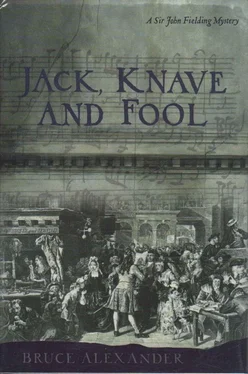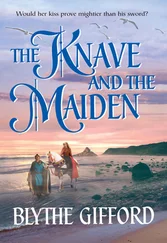Bruce Alexander - Jack, Knave and Fool
Здесь есть возможность читать онлайн «Bruce Alexander - Jack, Knave and Fool» весь текст электронной книги совершенно бесплатно (целиком полную версию без сокращений). В некоторых случаях можно слушать аудио, скачать через торрент в формате fb2 и присутствует краткое содержание. Год выпуска: 1999, ISBN: 1999, Жанр: Исторические приключения, на английском языке. Описание произведения, (предисловие) а так же отзывы посетителей доступны на портале библиотеки ЛибКат.
- Название:Jack, Knave and Fool
- Автор:
- Жанр:
- Год:1999
- ISBN:9780786217984
- Рейтинг книги:4 / 5. Голосов: 1
-
Избранное:Добавить в избранное
- Отзывы:
-
Ваша оценка:
- 80
- 1
- 2
- 3
- 4
- 5
Jack, Knave and Fool: краткое содержание, описание и аннотация
Предлагаем к чтению аннотацию, описание, краткое содержание или предисловие (зависит от того, что написал сам автор книги «Jack, Knave and Fool»). Если вы не нашли необходимую информацию о книге — напишите в комментариях, мы постараемся отыскать её.
Jack, Knave and Fool — читать онлайн бесплатно полную книгу (весь текст) целиком
Ниже представлен текст книги, разбитый по страницам. Система сохранения места последней прочитанной страницы, позволяет с удобством читать онлайн бесплатно книгу «Jack, Knave and Fool», без необходимости каждый раз заново искать на чём Вы остановились. Поставьте закладку, и сможете в любой момент перейти на страницу, на которой закончили чтение.
Интервал:
Закладка:
Having halted even so briefly, we had fallen somewhat behind Sir John and Lady Fielding. They now stood at the entrance to the tavern. They waited, I supposed on us, yet our lady seemed to be staring ever so intently at a coach which four matched horses had just drawn up to the walk.
It was indeed a remarkable coach. It rode upon carved, gilt wheels, and as we drew nigh I saw that it had upon its door panels scenes of the countryside in winter and spring most beautifully painted, clearly the work of an artist of great skill. Somehow, without running round to make sure of it, I knew that the two panels on the far side of the coach would display similar scenes depicting summer and autumn. When the footman jumped down to open the coach door and assist the occupants to the walk, I saw that he (as well as the driver) was dressed in a remarkable silver livery which glittered and shone even in the dim light of the streetlamp.
Lady Fielding was whispering a description of this garish vehicle to Sir John as Annie and I came up to them. I could tell from the amused expression upon his face that he recognized it from the likeness she sketched with her words.
“That coach,” said he, full-voiced, “can only belong to one man. Let US linger here a moment and greet him.”
I should not have been surprised had the Prince of Wales himself emerged from the coach with a party of his royal siblings. Yet one man only descended from the interior of the coach; and though richly dressed, he did not appear to me a prince-though perhaps a duke. Nevertheless, he was well acquainted with the Magistrate of the Bow Street Court.
“Sir John!” cried he. “You’re looking well, I must say.”
“Though I can’t, alas, say the same to you due to this fault of my eyes, I will say your voice, Sir Joshua, has never sounded heartier.”
“Well said, well said, and you may take that as an outward sign of my inward health.”
The two shook hands warmly, and Sir John presented us to Sir Joshua Reynolds, the great painter of portraits. Annie and me he introduced as “members of his household.” A few pleasantries passed between them as we moved toward the door of the Crown and Anchor. Once inside, we proceeded at a good pace, yet Lady Fielding kept a good, tight hold on her husband’s arm, guiding him gently through the uneven row of empty tables toward the inner doorway which led to the site of the evening’s festivities. Annie and I kept very close so as not to miss any titbit of interest that might pass between them. We were not left unrewarded.
“When, pray tell,” asked Sir Joshua Reynolds, “will you allow me to paint your portrait, Sir John?”
At that Sir John let forth a booming laugh. “Never, I fear. The modest budget I am given by the Lord Mayor’s office includes no allowance for personal vanity.”
“Nothing of the kind, sir. Vanity’s got little to do with it. A good likeness is a gift to posterity.”
“He’s right, Jack,” put in Lady Fielding.
“I doubt posterity will have reason to remember me,” said Sir John.
“Not so, sir. And putting all that aside, you’ve a face whose strength I should like to capture. It appeals to me as an artist.”
“Be willing to put aside your fee, would you?” Sir John said it in a teasing manner.
“Jack!” scolded his lady.
“Ah, now there you have me. I am an artist, true, but I am also a man of business. Yet an adjustment of some sort would not be out of the question.”
The three stood at the entrance to the ballroom. Before them was a great multitude seated at tables and milling about.
“Ah, but here we are,” said Sir Joshua. “My table is at the far side with some of my colleagues of the Royal Academy, and so I shall leave you here. Delighted to meet you, Lady Fielding, and you two young people, as well. Always a pleasure to see you, Sir John.”
He danced down the three stairs leading into the ballroom, and at the last he turned. “Do give some thought to what I suggested,” he called back.
“Oh, we shall, sir,” Lady Fielding replied. “Indeed we shall.”
Then with a wave, he was away, weaving through the crowd.
“Kate, please,” grumbled Sir John. “Don’t encourage the fellow. Have you any idea what he would ask? A hundred and fifty guineas, or so I have heard.”
“Oh dear,” said she. “Well, we may speak of it later.”
“But not a word of it at table.”
“Agreed.”
The Crown and Anchor is like unto many a tavern and inn in London, though more respectable than most. What sets it apart from all, however, is the great ballroom at its rear. At the head of it there is a stage, where at that moment, music stands and chairs were being assembled for the evening’s entertainment. The floor of the ballroom (on which there would be no dancing that night) was crammed with tables set so tight there was bare room enough for servers to pass between. Yet pass they did, for dinner had begun at many of the tables, and at the rest wine flowed freely. Arranged so, as many as four hundred could be seated in the grand ballroom, and it appeared that near that number were already present.
Annie and I stepped forward, for our eyes were keener than Lady Fielding’s, who was a bit shortsighted. We swept the assembly back and forth until at last my gaze fell upon a familiar figure, standing and waving to us from a near-empty table quite near the stage. It was unmistakably that of Mr. Gabriel Donnelly, formerly ship’s surgeon, now recently appointed (through Sir John’s intercession) as medical advisor to the coroner of the City of Westminster. I waved back and bade all follow me.
Wending our way through a narrow, devious path, squeezing past servers and many engaged in idle conversation, we came at last to the table where Mr. Donnelly and Mr. Oliver Goldsmith, the noted author, awaited us. Both were standing, smiling, greeting us in the most welcoming manner. How good it is to be among friends on such occasions. We seated ourselves, and at once the talk did bubble up as from a fountain.
Mr. Goldsmith jested about Mr. Donnelly’s sudden rise in society: “So many invitations has he now that he has quite forgot the taste of his own cooking.”
“What was ill to the taste is well forgotten,” said the surgeon. “In all truth, dear friends, you should know that Noll here — that is, Mr. Goldsmith — has connived most of these invitations for me, certainly those to the grandest houses.”
“But do tell, Mr. Donnelly,” inquired Lady Fielding, “areyou now well set in your new surgery?”
(At year’s beginning, Gabriel Donnelly had moved from his small place located in a walk-up in Tavistock Street to more spacious and altogether grander quarters in Drury Lane, formerly the surgery of the late Dr. Amos Carr.)
“Ah, very well indeed,” said he. “There is a waiting room of larger size for my patients — and the living quarters are separate and quite commodious. It is indeed a proper surgery for a better clientele.”
“And has such begun to appear?” asked Sir John.
“Oh, certainly, yes. I seem instantly to have inherited all the late Dr. Carr’s patients.”
“And shocked they must have been at his — ” Sir John searched a moment for the proper word. “At his sudden passing.”
“Ah yes, each must discuss it with me.”
“And has his ghost come to visit?”
“Not a bit of it. I’ve erased all trace of him-with alcohol and strong soap.”
“But,” said Mr. Goldsmith, “he is far too modest. Already his ascent into polite society has brought him patients of the gentler sort.”
And though his eyes twinkled at having spoken thus, his meaning eluded me, and perhaps it was so with the rest in our party, as well.
Perceiving this, Mr. Goldsmith leaned across the table and said in a stage whisper loud enough to be heard over the din of the crowd, “The … ladies, friends, the ladies. They seem to flock to him with all manner of ailments — a positive epidemic of female troubles of every sort seems to have hit the best houses in London. He brings it with him wherever he goes.”
Читать дальшеИнтервал:
Закладка:
Похожие книги на «Jack, Knave and Fool»
Представляем Вашему вниманию похожие книги на «Jack, Knave and Fool» списком для выбора. Мы отобрали схожую по названию и смыслу литературу в надежде предоставить читателям больше вариантов отыскать новые, интересные, ещё непрочитанные произведения.
Обсуждение, отзывы о книге «Jack, Knave and Fool» и просто собственные мнения читателей. Оставьте ваши комментарии, напишите, что Вы думаете о произведении, его смысле или главных героях. Укажите что конкретно понравилось, а что нет, и почему Вы так считаете.












